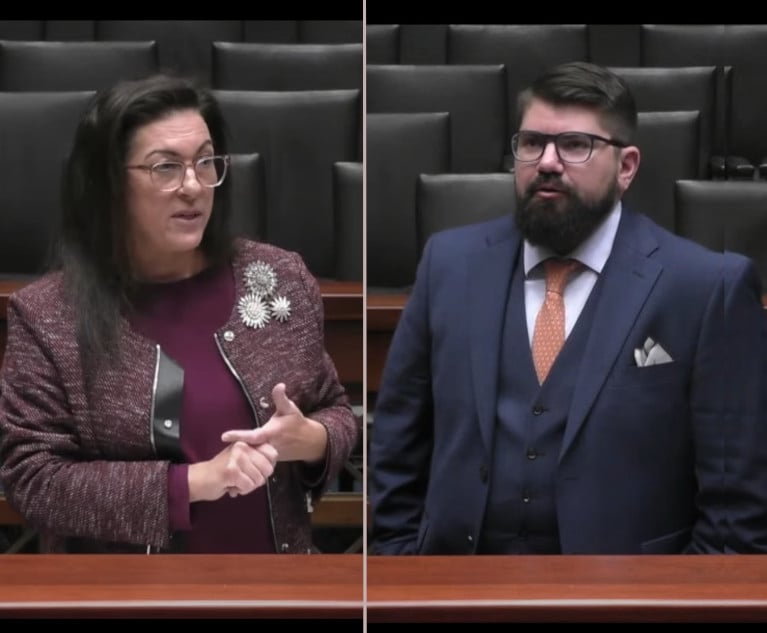Texas Law Schools Ranked by Affordability
As a new crop of prospective law students studies vigorously for the Law School Admission Test in pursuit of high scores, there's another set of…
September 30, 2018 at 06:00 AM
6 minute read

As a new crop of prospective law students studies vigorously for the Law School Admission Test in pursuit of high scores, there's another set of figures they should keep in mind.
Avoiding burdensome debt and securing a good chance at a lucrative job should be high on applicants' lists of “must-haves” from the law schools they choose.
A handful of Texas law schools have landed on national magazines' lists of affordable, best-value legal education institutions for those reasons. By studying the way that such publications scrutinize and rank law schools for affordability, applicants can glean insight about their possible financial futures at the law schools where they apply. Texas Lawyer has combed through a variety of records to pull together important metrics to help prospective Texas law students to analyze the affordability of Texas law schools.
The metrics that stand out in national rankings are: An average law graduates' debt load—less is best. Looking at a law school's annual tuition and living expenses can bear on the expected debt figure. Also important are the law school's bar passage rates and employment rates, which tell the odds that a graduate can land a legal job. Finally, applicants should consider each law schools' average starting salary for graduates, which can help them understand how tight their budgets will be when they're repaying their student loans.
For example, The National Jurist, a magazine about law schools, reported in its 2017 Best Value Law Schools list that law schools must keep a student's debt manageable, and provide a quality education, so students pass the bar exam and land good-paying jobs. The magazine looked at all of the nation's 200 law schools and several Texas schools landed on its list. It ranked Texas Tech University School of Law at No. 25, giving it an “A” grade. The University of Houston Law Center was No. 31 and The University of Texas School of Law was No. 39, both earning an “A-” on the list.
Student Loan Hero, a website that reports on student loan issues, studied 116 law schools to find the most affordable programs based on tuition costs, indebtedness and post-graduation employment rates and salaries. A couple of Texas law schools made its list for affordability: Houston came in at No. 5, Texas was No. 6, and Southern Methodist University Dedman School of Law was No. 49.
When judging the metrics of Texas law schools, it's helpful to compare them to the national average, which Student Loan Hero reported in its survey about the 2016 to 2017 school year. The average law school's annual tuition is about $36,100 and most law school graduates end up with $111,800 in debt. An average law school's employment rate is 87 percent and a typical graduate's starting salary is $73,700, said the website.
Here's the gold standard: At Student Loan Hero's 20 most affordable law schools, a student paid an average of $25,400 in annual tuition, finished with $83,200 in debt and landed a job paying $78,600, creating a debt-to-income ratio of 0.94.
Below is all of the important data points about Texas law schools to help applicants envision their finances after graduation. Most of this information came from the schools' 2017 disclosures to the American Bar Association Section of Legal Education and Admissions to the Bar, the body that accredits law schools. Information on average debt and median grant amounts came from U.S. News & World Report's 2019 Best Law Schools rankings. Data about a school's average starting salary came from the school's reports to The National Association for Law Placement, which some schools voluntarily post to their websites—while others refuse to share salary data. Some schools' salary data was only available for 2016, while others provided Texas Lawyer with 2017 graduates' salaries.
Schools are listed in alphabetical order.
Baylor University School of Law in Waco
Average debt of 2017 grads: $91,679
Average 2017 starting salary: $95,324
—
In-state tuition: $60,050
Living off campus: $19,341
First-time bar pass rate: 92%
Employment rate: 95%
Southern Methodist University Dedman School of Law in Dallas
Average debt of 2017 grads: $131,711
Average 2017 starting salary: $105,585
—
In-state tuition: $52,586
Living off campus: $26,100
First-time bar pass rate: 84%
Employment rate: 92%
South Texas College of Law Houston
Average debt of 2017 grads: $123,715
Average 2017 starting salary: N/A
—
In-state tuition: $31,500
Living off campus: $21,900
Students receiving grants: 54%
Employment rate: 78%
St. Mary's University School of Law in San Antonio
Average debt of 2017 grads: $116,635
Average 2017 starting salary: $69,248
—
In-state tuition: $36,310
Living off campus: $20,684
First-time bar pass rate: 79%
Employment rate: 82%
Texas A&M University School of Law in Fort Worth
Average debt of 2017 grads: $122,562
Average 2016 starting salary: $69,665
—
In-state tuition: $28,504
Living off campus: $29,214
First-time bar pass rate: 81%
Employment rate: 82%
Texas Southern University Thurgood Marshall School of Law in Houston
Average debt of 2017 grads: N/A
Average 2017 starting salary: N/A
—
In-state tuition: $20,418
Living off campus: $20,986
First-time bar pass rate: 60%
Employment rate: 81%
Texas Tech University School of Law in Lubbock
Average debt of 2017 grads: $82,355
Average 2017 starting salary: $67,457
—
In-state tuition: $22,996
Living off campus: $16,059
First-time bar pass rate: 84%
Employment rate: 84%
University of Houston Law Center
Average debt of 2017 grads: $92,899
Average 2017 starting salary: $99,011
—
In-state tuition: $31,021
Living off campus: $16,584
First-time bar pass rate: 84%
Employment rate: 87%
University of North Texas Dallas College of Law
Average debt of 2017 grads: N/A
Average 2017 starting salary: $85,038
—
In-state tuition: $8,748
Living off campus: $19,334
First-time bar pass rate: 68%
Employment rate: 91%
University of Texas School of Law in Austin
Average debt of 2017 grads: $100,312
Average 2017 starting salary: $119,377
—
In-state tuition: $35,015
Living off campus: $20,579
First-time bar pass rate: 89%
Employment rate: 91%
Angela Morris is a freelance journalist. Follow her on Twitter at @AMorrisReports.
This content has been archived. It is available through our partners, LexisNexis® and Bloomberg Law.
To view this content, please continue to their sites.
Not a Lexis Subscriber?
Subscribe Now
Not a Bloomberg Law Subscriber?
Subscribe Now
NOT FOR REPRINT
© 2025 ALM Global, LLC, All Rights Reserved. Request academic re-use from www.copyright.com. All other uses, submit a request to [email protected]. For more information visit Asset & Logo Licensing.
You Might Like
View All
'It's Like They Lynched You:' Law Professor's Discrimination Claim Reaches High Court
7 minute read


Trending Stories
- 1'It's Not Going to Be Pretty': PayPal, Capital One Face Novel Class Actions Over 'Poaching' Commissions Owed Influencers
- 211th Circuit Rejects Trump's Emergency Request as DOJ Prepares to Release Special Counsel's Final Report
- 3Supreme Court Takes Up Challenge to ACA Task Force
- 4'Tragedy of Unspeakable Proportions:' Could Edison, DWP, Face Lawsuits Over LA Wildfires?
- 5Meta Pulls Plug on DEI Programs
Who Got The Work
Michael G. Bongiorno, Andrew Scott Dulberg and Elizabeth E. Driscoll from Wilmer Cutler Pickering Hale and Dorr have stepped in to represent Symbotic Inc., an A.I.-enabled technology platform that focuses on increasing supply chain efficiency, and other defendants in a pending shareholder derivative lawsuit. The case, filed Oct. 2 in Massachusetts District Court by the Brown Law Firm on behalf of Stephen Austen, accuses certain officers and directors of misleading investors in regard to Symbotic's potential for margin growth by failing to disclose that the company was not equipped to timely deploy its systems or manage expenses through project delays. The case, assigned to U.S. District Judge Nathaniel M. Gorton, is 1:24-cv-12522, Austen v. Cohen et al.
Who Got The Work
Edmund Polubinski and Marie Killmond of Davis Polk & Wardwell have entered appearances for data platform software development company MongoDB and other defendants in a pending shareholder derivative lawsuit. The action, filed Oct. 7 in New York Southern District Court by the Brown Law Firm, accuses the company's directors and/or officers of falsely expressing confidence in the company’s restructuring of its sales incentive plan and downplaying the severity of decreases in its upfront commitments. The case is 1:24-cv-07594, Roy v. Ittycheria et al.
Who Got The Work
Amy O. Bruchs and Kurt F. Ellison of Michael Best & Friedrich have entered appearances for Epic Systems Corp. in a pending employment discrimination lawsuit. The suit was filed Sept. 7 in Wisconsin Western District Court by Levine Eisberner LLC and Siri & Glimstad on behalf of a project manager who claims that he was wrongfully terminated after applying for a religious exemption to the defendant's COVID-19 vaccine mandate. The case, assigned to U.S. Magistrate Judge Anita Marie Boor, is 3:24-cv-00630, Secker, Nathan v. Epic Systems Corporation.
Who Got The Work
David X. Sullivan, Thomas J. Finn and Gregory A. Hall from McCarter & English have entered appearances for Sunrun Installation Services in a pending civil rights lawsuit. The complaint was filed Sept. 4 in Connecticut District Court by attorney Robert M. Berke on behalf of former employee George Edward Steins, who was arrested and charged with employing an unregistered home improvement salesperson. The complaint alleges that had Sunrun informed the Connecticut Department of Consumer Protection that the plaintiff's employment had ended in 2017 and that he no longer held Sunrun's home improvement contractor license, he would not have been hit with charges, which were dismissed in May 2024. The case, assigned to U.S. District Judge Jeffrey A. Meyer, is 3:24-cv-01423, Steins v. Sunrun, Inc. et al.
Who Got The Work
Greenberg Traurig shareholder Joshua L. Raskin has entered an appearance for boohoo.com UK Ltd. in a pending patent infringement lawsuit. The suit, filed Sept. 3 in Texas Eastern District Court by Rozier Hardt McDonough on behalf of Alto Dynamics, asserts five patents related to an online shopping platform. The case, assigned to U.S. District Judge Rodney Gilstrap, is 2:24-cv-00719, Alto Dynamics, LLC v. boohoo.com UK Limited.
Featured Firms
Law Offices of Gary Martin Hays & Associates, P.C.
(470) 294-1674
Law Offices of Mark E. Salomone
(857) 444-6468
Smith & Hassler
(713) 739-1250






